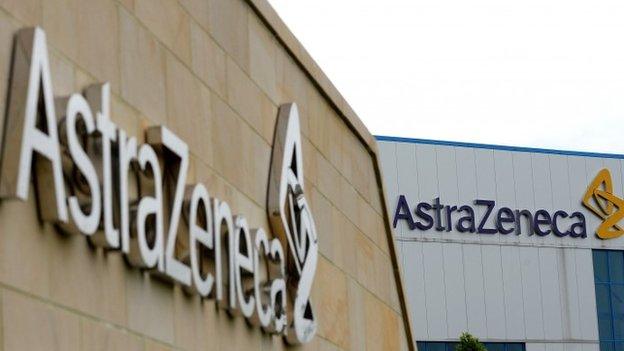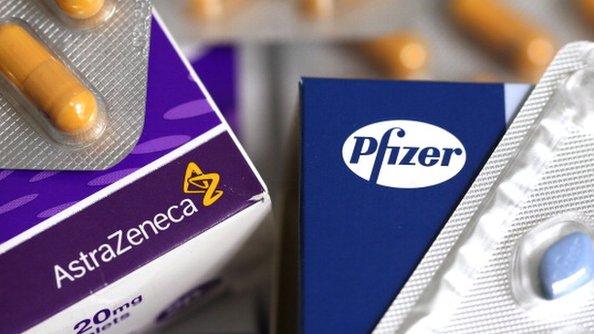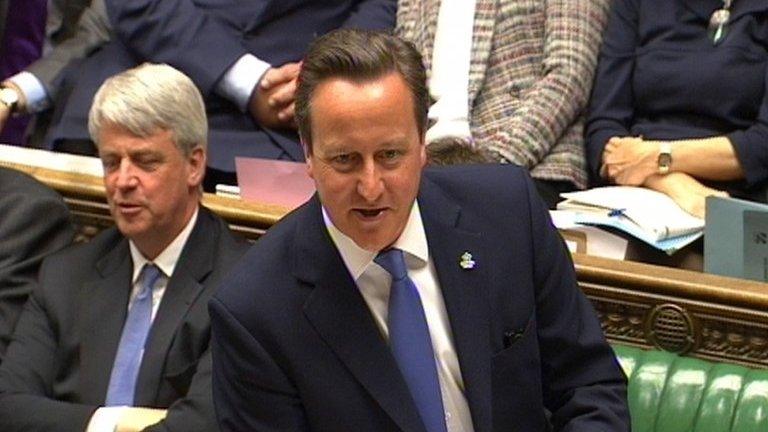George Osborne will be 'hard-nosed' over Pfizer deal
- Published

The chancellor says he will take a "hard-nosed approach" to determine whether Pfizer's proposed £60bn takeover of UK firm AstraZeneca will deliver for UK jobs and science.
George Osborne added that it would be "extraordinary" not to engage with US pharmaceutical giant.
Pfizer's chairman Ian Read says the proposal is a "win-win for society".
Labour said the firm's promises regarding the proposed deal were "not worth the paper they are written on".
Some fear the currently-rejected deal could jeopardise Britain's science and medical industries.
Four British scientific bodies - the Society of Biology, Biochemical Society, British Pharmacological Society and Royal Society of Chemistry - have warned that recent mergers and acquisitions have led to lab closures, threatening the research base.
AstraZeneca has eight sites in the UK and about 6,700 employees.
Pfizer chairman Iain Read speaking in a video on the firm's website: "This is a win-win for society"
Pfizer offered £63bn for the UK pharmaceutical firm on 2 May. If the deal were to go ahead, it would be the biggest takeover in UK corporate history.
AstraZeneca's board said the offer - the second Pfizer has made - was too low, and that it believed a major driver for the takeover was the move to establish a tax residence in the UK by changing its company structure.
MPs will investigate the proposed takeover deal next week.
'Win-win'
Mr Osborne told BBC Radio 4's Today programme: "My job is to create both a really competitive place for businesses to come to Britain and create jobs in Britain. And we're seeing those jobs being created.
"But I'm also, on the specifics, prepared to get in the room and have a hard negotiation with very large companies and be very, very, hard-nosed about what we want to deliver in terms of good British science and good British jobs."
George Osborne: "My only interest is securing good British jobs in good British science"
Pfizer has said it would relocate large parts of its business to the UK if the deal goes through. It has also suggested it wants to invest in research which could create more jobs.
BBC business editor Kamal Ahmed said Britain was highly attractive because of its low corporation tax levels and the tax incentives for scientific research.
In a series of videos posted on Pfizer's website, Mr Read said the proposed takeover was motivated by "three components of value", including combining some of the companies' products and improving efficiency.
"I think both companies have strategies that are aimed at growing and aimed at meeting patients' needs," he said.

"I believe that by combining these two companies we strengthen those possibilities. We strengthen the ability to bring products to patients. We strengthen the financial aspects of the company."
He added: "We can invest in science. I see this as a win-win for society, a win-win for shareholders, and a win-win for stakeholders."
MPs' questioning
The government has powers to veto certain deals, such as those involving defence and media companies, and apply a "public interest test". But this is rare, and its scope to intervene is also limited by the European Commission.
Prime Minister David Cameron told the Commons this week that Pfizer's assurances - including retaining at least 20% of the combined companies' research and development workforce in the UK for at least five years and basing its European HQ in Britain - were "encouraging".
But he said he was "not satisfied" with them and wanted the firm to do more.
Shadow business secretary Chuka Umunna MP said the assurances Pfizer had given ministers were "not worth the paper they are written on," as it had refused to rule out breaking up AstraZeneca in the future.
"The government could act immediately to work to put in place a stronger public interest test encompassing cases with an impact on strategic elements of our science base and seek a proper, independent assessment of the potential takeover as Labour has called for. Instead, ministers have sat on their hands," he said.
Mr Read and AstraZeneca chief executive Pascal Soriot will be questioned by the Business, Innovation and Skills Committee on Tuesday morning.
They will then face MPs on the Science and Technology Committee on Wednesday, when Science Minister David Willetts will also be asked about the government's position.
AstraZeneca employs more than 51,000 staff worldwide, with 6,700 in the UK. Pfizer - whose drugs include Viagra - has a global workforce of more than 70,000, with 2,500 in the UK.
- Published9 May 2014

- Published9 May 2014

- Published7 May 2014
